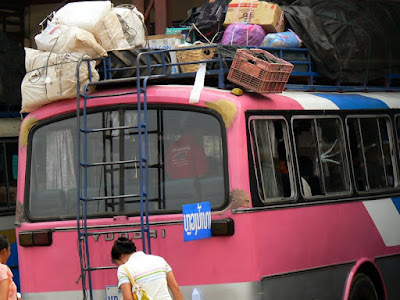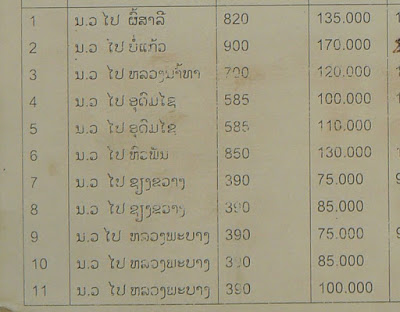
Luang Namtha Bus at Northern Bus Station Vientiane
The bus isn’t as bad as the name might suggest. For one thing it never takes 22 hours, they just say that in case. Maybe it used to, I don’t know. I think the whole trip could be done in eighteen or so hours if they eliminated all stops except to the short ones every four hours.
I missed getting seats up front near the driver, so I settled for what looked to be second best, close to the rear door. Good for quick exits for breaks. My wife dropped me off an hour early just to get the good seats but others had the same idea and got the jump on me. The bus did leave pretty much on time even though not full. Sometimes it’s beginning to seam as if Lao busses leave on some sort of schedule, like the one posted in the ticket office. Quite the surprise, I’d been prepared to wait another couple hours for people to show up, and here we were leaving.
The first thing we did after leaving was drive over to the fuel pumps, then we parked up past Dalat Sii Kai for forty minutes. The driver had important things to take care of. You’d think he could have said goodbye to his wife earlier

Bus Distances and Price
#1Phongsali
#2 Bokeo (Huay Xai?)
#3 Luang Namtha
#4 and #5 Oudomxia
#6 Hua Phan (Samnuea?)
#7+8 Xiengkuan,
#s 9,10,+11 Luang Prabang
I know you’re probably thinking, why not take the plane. I don’t like the plane. I mean I don’t mind the plane itself, or flying, but I don’t like having to plan my life out two weeks in advance while on vacation, or else fly stand by and have to spend all that time at the airport, and maybe not even go. The bus is simple. Go there, get a ticket, 21 hours later you are in Luang Namtha. I like meeting the Lao people on the busses too. I almost forgot, it’s way cheap. Twelve dollars to go seven hundred kilometres through the mountains.
The bus began to fill up after we got under way. All of those mid sized towns seemed to end up having a couple people. I think we collected five people at that Hmong town of Ha-sip-song. Didn’t even stop at Vang Vien, no English written across the front of the bus. By the time we left Kasi almost all the seats were full.
There were a couple of girls sitting across from me. Kind of chubby and falling out of their too short pants, but friendly, young and silly. For them this was some kind of exciting fun party. The excitement began to wear off by about the thirteen hundredth switch back on the way to Luang Prabang. Everyone was wishing that they could fall all the way to sleep but about the time you would dose off a sharp turn would bump you up against whatever you had been avoiding, to remind you that yes, you are on that bus to Luang Namtha.
I don’t have the route to Luang Prabang memorized yet. There is still a valley that you drive down into towards the latter part of the day only to realize that you still have another mountain to go over. Soon it was dark and the dry season fires on the sides of the mountains were pretty. It seemed like the swathes of open ground were huge, hundreds of acres, the whole sides of mountains. I think the timber industry gave the hill tribe folks a head start on the trees of Luang Prabang. I’ve never seen that kind of a burning pattern for regular slash and burn agriculture.
The southern bus station in Luang Prabang was another food stop, and we all piled out to eat at the bus station restaurants. I opted for a very common barbequed chicken with a side of steamed greens and sticky rice. (Ping Gai, Soup Pak, Kow Nee Ow, and jeao makpet to spice it up) A middle aged Hmong guy from the bus joined me. He was headed only to Pak Mong. A lot of the people weren’t headed to Luang Namtha but rather to points along the way.
Some Chinese people came in the café also, I knew from the clothes but also the proprietress of the restaurant started using sign language and saying, “Shur Fan, Shur Fan”. (Eat rice, eat rice). A couple of the Chinese followed her back to the wok where she stir fried them some rice and they pointed to ingredients they wanted put in. I’d bet a million bucks they also went back to make sure she didn’t put in any plah dek or fish sauce. I had to laugh. Here the Chinese were getting the same food as western tourists. I guess the general rule of thumb at restaurants is, when in doubt, serve them fried rice.
I got back on the bus early, just in time to save my seat from being stolen. The Chinese have different rules of bus etiquette than the Lao. You snooze, you lose. They were well aware of the Lao rules too, they just had a hard time bringing themselves to comply. In China if you behaved like the Lao, you would end up without food, or a place to sleep. It’s the land of sharp elbows. I heard some Chinese guys discussing whether to take a seat, they didn’t want to because there were some half full water bottles left in the pocket behind the seats. It’s hard to not sit down just because someone might be sitting there. Generally the Lao will tell each other who is sitting where, but the Chinese don’t speak Lao, and the Lao didn’t speak Chinese.
I translated as best I could. I never was any good at Mandarin. Immediately I found my voice getting louder and my body language more expressive, as the R’s became richer and the G’s more guttural. I like Mandarin as it’s spoken in China. None of that hissing snake sound of Taiwan for me. The most fun part is calling everyone comrade. I’ve had Chinese people tell me they don’t use that word anymore, and that it’s a word from the old days. I think it’s funny as all get out. China and Laos are both comradely socialist societies moving towards capitalism with a Marxist Leninist approach. Right?
A Lao lady was trying to save the two chubby girls seats for them. Of course the Chinese lady who wanted the seats didn’t appreciate my explanation at all. Much better not to understand. When the people who had been at the restaurant got back on the bus, there were lots of loud voices and gestures, but no truly bad feelings. The Lao were familiar enough with the Chinese to realize that the loud voices are a cultural thing, and the Chinese for their part understood the unwritten bus rules in Laos, and did give up any previously occupied seats. I sized up the scene, and pulled the smallest Chinese guy of the bunch down into the empty seat beside me, he didn’t smoke either. Better him than that chain smoking, spitting fellow with the big shoulders.
Many of the Chinese had trooped into the restaurant as a group. I assumed somehow they were family. Now I began to understand that the two skinny pale young guys who spoke Lao had all the tickets and identity papers. They were the leaders. The others were being brought to various places in China, or at least across the border, probably for a set fee including transportation. Five or six of the Chinese ended up on the plastic chairs mid aisle. That’s how it goes, last on get the worst seats.
One of the young guys made the fellow sitting next to me move so he could sit there.
There was also an argument over the tickets. The price of tickets is set. Seems to be non negotiable and known by all. I’ve never been charged a “falang price” for a bus. The Chinese had paid through Oudomxai I think and they were headed almost to Luang Namtha. They were jumping off at the road to Boten and the border. The busses are privately owned, usually by the driver and his family. The extra fair for all of the Chinese added up to quite a bit of money, maybe ten dollars or more. First the bus kid came back on his usual rounds to check tickets and write tickets to those without. He got nowhere. After consulting with the driver he came back and told them they had to pay. Nothing Doing.
Ten o’clock turned into twelve and the Hmong guy got off. Sometime long after midnight another bus guy came back to talk about the fare with the Chinese. Discussing it were not only the two skinny kids who spoke Lao, but also an older fellow with a very thick neck, the muscle. The whole shouting match arms with arms a flinging was happening about three inches from my face. The bus guy didn’t seem too intimidated, all concerned knew that rural Laos is the wrong place to get in a punch up with a bus guy. You might end up with something bad happening. They paid.
Later still, around three I guess, all the Chinese woke up from their slumber seemingly refreshed and excited to be nearing the place to jump on a pick up truck and head for the border. People broke out snacks and started choking down cigarettes. You’ve got to hand it to the Chinese. Fun for them is taking all night bus rides and then standing around shivering at a remote mountain border waiting for sunrise.
The little guy who had first sat next to me was headed for Shanghai. He had days and days more of this to go. Third class all the way. There is some kind of Chinese expression about bitter soup. I don’t remember how it goes. Something about how you give the Chinese hard times and they manage to make soup out of the deal. Good travelers, I don’t think the tourist label quite fits.

The road to Zhongdien, and Tibet, Yunnan January 1994
The bus rolled into the Luang Namtha station just after five in the morning. Amazing how many people were asleep outside the market on the ground. Families, dogs, vegetables. I waited for someone to wake up at Zuela’s.
No comments:
Post a Comment